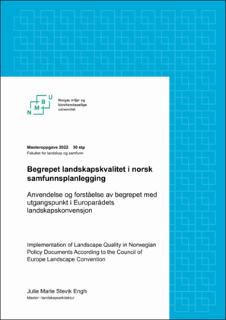| dc.contributor.advisor | Clemetsen, Morten | |
| dc.contributor.author | Engh, Julie Marie Stevik | |
| dc.coverage.spatial | Norway | en_US |
| dc.date.accessioned | 2022-09-16T13:19:50Z | |
| dc.date.available | 2022-09-16T13:19:50Z | |
| dc.date.issued | 2022 | |
| dc.identifier.uri | https://hdl.handle.net/11250/3018506 | |
| dc.description.abstract | Landskap som begrep rommer mye. Europarådets landskapskonvensjon tar sikte på å skape en felles enighet og forståelse om at landskap er et felles gode og en ressurs som må forvaltes. Konvensjonen understreker viktigheten av landskap – alle landskap – fra de sjeldne og fantastiske til hverdagslandskapene og de med stort potensiale for utvikling. Landene som har godkjent konvensjonen skal etter artikkel 6D sette «mål for landskapskvalitet», som innebærer at sektormyndighetene skal sette mål for utvikling av bestemte landskap med hensyn til befolkningens ønsker og preferanser. Innholdet i begrepet landskapskvalitet synes å være uklart, og det er å utforske begrepet som er målet med oppgaven. Hovedproblemstillingen for oppgaven har vært «Hvordan er begrepet landskapskvalitet anvendt i norsk samfunnsplanlegging?» med underproblemstillingen «Hvordan kan begrepet landskapskvalitet forstås i lys av Europarådets landskapskonvensjon?».
Metoden som er benyttet i oppgaven er en kvalitativ innholdsanalyse. Det er valgt ut politiske og faglige dokumenter fra tre sektorer; transportsektoren, sektor for kommunal og regional planlegging og energisektoren. Sektorene er valgt ut fordi de jobber med saker som angår landskap. Analysen utforsker hvordan begrepet landskapskvalitet er anvendt i de ulike sektorene. Resultatene viser at landskapskvalitet i mange tilfeller må forstås gjennom andre begrep og uttrykk for at det skal ha et innhold eller en mening. I analysen er landskapskvalitet forstått som det som gir landskapet verdi, etter tolkningen min om at landskapet har en kvalitetsbasert verdi. Konklusjonen i oppgaven er at forvaltningen må jobbe mer målrettet med å oppfylle landskapskonvensjonen gjennom å gi begrepene tydeligere innhold. Dette er avgjørende for at konvensjonen skal kunne implementeres i sektorene som arbeider med landskap og på nasjonalt, regionalt og lokalt forvaltningsnivå. Felles forståelse av landskapskvalitet og fastsettelse av mål for landskapskvalitet kan dermed bidra til en mer integrert samfunnsplanlegging. | en_US |
| dc.description.abstract | Landscapes as a concept fathoms a lot. The Council of Europe's Landscape Convention aims to create a common ground and understanding that landscapes are a common good and a resource that must be managed. The convention emphasizes the importance of landscapes - all landscapes - from the rare and wonderful to the everyday landscapes and those with potential for development. The countries that have approved the convention must, in accordance with Article 6D, set "landscape quality objectives", which means that the sectoral authorities must set objectives for the development of specific landscapes with regard to the wishes and preferences of the population. The content of the concept of landscape quality seems to be unclear, and the goal of the thesis is to explore this. The main issue for the thesis has been «How is the concept of landscape quality used in Norwegian community planning?» with the sub-issue «How can the concept of landscape quality be understood in the light of the Council of Europe's landscape convention?».
The method used in the thesis is a qualitative content analysis. Political and professional documents from three sectors have been selected; the transport sector, the municipal and regional planning sector and the energy sector. The sectors have been selected because they work with issues related to landscape. The analysis explores how the concept of landscape quality is applied in the various sectors. The results show that landscape quality in many cases must be understood through other concepts and expressions for it to have a content or a meaning. In the analysis, landscape quality is understood as what gives the landscape value, according to my interpretation that the landscape has a quality-based value. The conclusion of the thesis is that the planning administration must work targeted to fulfill the landscape convention by giving the concept landscape quality a more clear meaning. This is crucial for the convention to be implemented in the sectors that work with landscapes and at national, regional and local administrative level. Creating a common understanding of landscape quality and setting goals for landscape quality can thus contribute to a more integrated community planning. | en_US |
| dc.language.iso | nob | en_US |
| dc.publisher | Norwegian University of Life Sciences, Ås | en_US |
| dc.rights | Attribution-NonCommercial-NoDerivatives 4.0 Internasjonal | * |
| dc.rights.uri | http://creativecommons.org/licenses/by-nc-nd/4.0/deed.no | * |
| dc.title | Begrepet landskapskvalitet i norsk samfunnsplanlegging : anvendelse og forståelse av begrepet med utgangspunkt i Europarådets landskapskonvensjon | en_US |
| dc.title.alternative | Implementation of landscape quality in Norwegian policy documents according to the Council of Europe Landscape Convention | en_US |
| dc.type | Master thesis | en_US |
| dc.description.localcode | M-LA | en_US |

